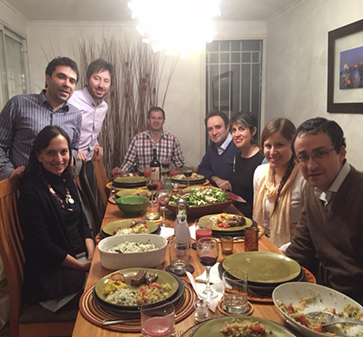Daniel Rottig: «Perhaps the greatest threat to not only multinational corporations, but also for humanity, global climate change. Yet, many of these challenges can be considered opportunities»
junio 4, 2018

[:es]Professor Daniel Rottig holds a Ph.D. degree in Management with emphasis on Global Strategy and International Business, an MBA degree in International Business, an undergraduate degree (German Diploma) in Business Administration with a triadic emphasis on International Economics, Finance, and Marketing, and a Diploma in International Studies. This May, he visited UC for the second year in a row to teach the MBA course “Managing multinational corporations”. We asked some questions about his course and his visit to UC, and you can find his answers below.
What do you like most about doing classes in the UC MBA?
What I like most about teaching classes in UC’s MBA program are the remarkable backgrounds, experiences and quality of students and the variety of programs they represent. The excellent caliber of students paired with an exceptional administration, are unrivaled. It is, therefore, an honor and great pleasure for me to be part of this outstanding, top-rated program in Latin America, and to contribute to its continued growth and development as an international visiting professor of global strategy and international business.
What is the main challenge of managing multinational companies?
Multinational corporations, in today’s globalized and hypercompetitive markets, face a number of challenges ranging from; political regime changes and related political risk, uncertain government policies toward trade and investment –and a recent backlash to further globalization in many countries and regions–,the increasing global political and economic power and influence of the communist China, ongoing political, social and territorial conflicts around the globe, disruptions of traditional business models due to advances in technology, and perhaps the greatest threat to not only multinational corporations, but also for humanity, global climate change
Yet, many of these challenges can be considered opportunities for multinational corporations. These opportunities include the development of sustainable products and services, as well as environmentally friendly ways of manufacturing and transporting products around the globe, that lead to the creation of shared value (i.e. economic value in the form of corporate profits, as well as social value and environmental benefits), capitalizing on technological advances -by building entirely new business models based on the Blockchain technology-, and recent advances in robotics and artificial intelligence, and the considerable economic (as well as social) investment opportunities in Africa, which is considered the last frontier for international business and expected to be home to more than 2 billion people and a quarter of the world’s labor force by 2050.
Which multinational companies are a reference for you and in what sense are they?
Prior to my academic career, I had the opportunity to work for such multinational corporations as Merrill Lynch in the United States, and ING Group in Europe. I also worked for a private financial services company, and led a nonprofit consulting company in my home country (Germany) as chairman for several years. I have therefore had experience working for small and medium-sized enterprises and for large multinational corporations, as well as for different types of companies including for-profit and nonprofit. During this time and my subsequent academic career, I have had the opportunity to interact with, and do research on, a large number of multinational corporations (MNCs).
I believe that those MNCs that constantly reinvent themselves, that are better able and faster than their competitors to forecast, assess and respond to new trends and developments in the global economy, and that are not afraid to take calculated risks, make bold decisions and dare mighty things in order to be better prepared for the future, are those that will succeed not only in their local markets, but also in the global economy.
The course on ‘Managing Multinational Corporations’, which I teach in UC’s MBA program every year, prepares graduate students to better understand the complexity of entering foreign markets, and to effectively manage the international business operations of multinational corporations. The course covers the various strategic and operational issues confronting MNCs when entering international markets, with focus on equity-based entry modes, and discusses the managerial opportunities and challenges of managing multinational corporations.[:]
Sigue explorando






